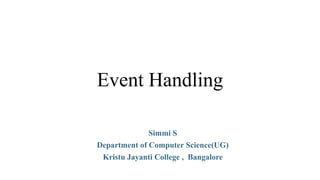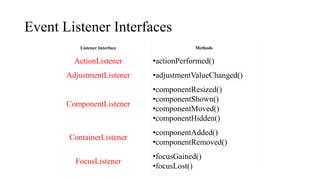Java Programming :Event Handling(Types of Events)
- 1. Event Handling Simmi S Department of Computer Science(UG) Kristu Jayanti College , Bangalore
- 2. Event handling is fundamental to Java programming because it is used to create event driven programs eg Applets GUI based windows application Web Application Event handling mechanism have been changed significantly between the original version of Java (1.0) and all subsequent versions of Java, beginning with version 1.1. The modern approach to handling events is based on the delegation event model, Event Handling
- 3. What is an Event? Change in the state of an object is known as event i.e. event describes the change in state of source. Events are generated as result of user interaction with the graphical user interface components. For example, clicking on a button, moving the mouse, entering a character through keyboard, selecting an item from list, scrolling the page are the activities that causes an event to happen.
- 4. Types of Event The events can be broadly classified into two categories: Foreground Events - Those events which require the direct interaction of user. They are generated as consequences of a person interacting with the graphical components in Graphical User Interface. For example, clicking on a button, moving the mouse, entering a character through keyboard, selecting an item from list, scrolling the page etc. Background Events - Those events that require the interaction of end user are known as background events. Operating system interrupts, hardware or software failure, timer expires, an operation completion are the example of background events.
- 5. Event Handling is the mechanism that controls the event and decides what should happen if an event occurs. This mechanism have the code which is known as event handler that is executed when an event occurs. Java Uses the Delegation Event Model to handle the events. This model defines the standard mechanism to generate and handle the events. Let's have a brief introduction to this model. What is Event Handling?
- 6. Source & Listener The Delegation Event Model has the following key participants namely: Source - The source is an object on which event occurs. Source is responsible for providing information of the occurred event to it's handler. Java provides classes for source object. Listener - It is also known as event handler. Listener is responsible for generating response to an event. From java implementation point of view the listener is also an object. Listener waits until it receives an event. Once the event is received , the listener process the event an then returns.
- 7. Source & Listener Its concept is quite simple: a source generates an event and sends it to one or more listeners. In this scheme, the listener simply waits until it receives an event. Once an event is received, the listener processes the event and then returns. This provides an important benefit: notifications are sent only to listeners that want to receive them. To perform Event Handling, we need to register the source with the listener.
- 8. Registering Listener A source must register listeners in order for the listeners to receive notifications about a specific type of event. Each type of event has its own registration method. Here is the general form: public void addTypeListener (TypeListener el) Type is the name of the event, and el is a reference to the event listener. For example, the method that registers a keyboard event listener is called addKeyListener( ). The method that registers a mouse motion listener is called addMouseMotionListener( ).
- 10. Event Classes in Java
- 11. Event Classes in Java
- 12. Event Classes in Java
- 13. Event Listener Interfaces As explained, the delegation event model has two parts: sources and listeners. Listeners are created by implementing one or more of the interfaces defined by the java.awt.event package. When an event occurs, the event source invokes the appropriate method defined by the listener and provides an event object as its argument
- 14. Event Listener Interfaces Listener Interface Methods ActionListener •actionPerformed() AdjustmentListener •adjustmentValueChanged() ComponentListener •componentResized() •componentShown() •componentMoved() •componentHidden() ContainerListener •componentAdded() •componentRemoved() FocusListener •focusGained() •focusLost()
- 15. Event Listener Interfaces ItemListener •itemStateChanged() KeyListener •keyTyped() •keyPressed() •keyReleased() MouseListener •mousePressed() •mouseClicked() •mouseEntered() •mouseExited() •mouseReleased() MouseMotionListener •mouseMoved() •mouseDragged() MouseWheelListener •mouseWheelMoved()
- 16. Java MouseListener Interface The Java MouseListener is notified whenever you change the state of mouse. It is notified against MouseEvent. The MouseListener interface is found in java.awt.event package. It has five methods
- 17. Methods of MouseListener interface The signature of 5 methods found in MouseListener interface are given below: public abstract void mouseClicked(MouseEvent e); public abstract void mouseEntered(MouseEvent e); public abstract void mouseExited(MouseEvent e); public abstract void mousePressed(MouseEvent e); public abstract void mouseReleased(MouseEvent e);
- 20. Java KeyListener Interface The Java KeyListener is notified whenever you change the state of key. It is notified against KeyEvent. The KeyListener interface is found in java.awt.event package, and it has three methods
- 21. Interface declaration Following is the declaration for java.awt.event.KeyListener interface: public interface KeyListener extends EventListener Sr. no. Method name Description 1. public abstract void keyPressed (KeyEvent e); It is invoked when a key has been pressed. 2. public abstract void keyReleased (KeyEvent e); It is invoked when a key has been released. 3. public abstract void keyTyped (KeyEvent e); It is invoked when a key has been typed
- 22. THANK YOU





















